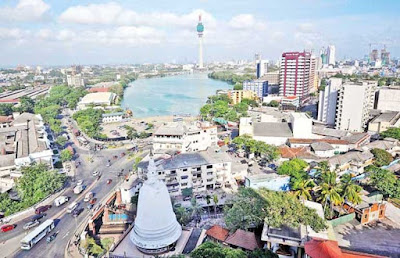The Government yesterday encouraged more than 200
forthcoming financial specialists from China, Wall Street, London, Geneva,
Dubai, Hong Kong, Singapore and Amsterdam on the perpetual venture openings in
Sri Lanka at the inaugural Sri Lanka Economic and Investment Conclave (SEIC)
2017 which commenced in Colombo yesterday.
Conveying the keynote address, Megapolis and Western
Development Minister Patali Champika Ranawaka focused on that the Government
was quick to support foreign investors and technology contributors to invest in
Sri Lanka's significant projects and available investment opportunities, which
were fundamentally connected with the nation's modern smart city concept.
"The global private sector will be considered as our
key accomplices. The Government will just put resources and investments into the
most essential areas without a doubt to the fundamental territories. We have arranged the
foundation to suit cutting edge necessities on account of an advanced
perspective and promoting a public-private
partnership (PPP) model,” he included.
Noticing that Sri Lanka is blessed with a highly literal
population, strong legal system and a holding a key position in the strategic
location in South Asia, the Minister welcomed all investors to leave their
impression in Sri Lanka, which he portrayed as the hub of the Indian Ocean.
The minister also acknowledged China's longstanding
companionship and said China today was the biggest investor to Sri Lanka.
The Central Bank Governor Dr. Indrajit Coomaraswamy said
the worldwide economy had various tailwinds for Sri Lanka and considering all
the macroeconomic variables, it furnishes the nation with an awesome chance to
assist financial and economic success.
“The global economy has a number of tailwinds for Sri Lanka. The macroeconomic fundamentals are being strengthened through clear frameworks which have been put in place to provide consistent and predictable policies, while a growth framework has been improved for the investment climate. We have the location and we have excellent international relations with all the countries in the world. So when you take all of that together Sri Lanka provides you with a great opportunity,” he included.
“The global economy has a number of tailwinds for Sri Lanka. The macroeconomic fundamentals are being strengthened through clear frameworks which have been put in place to provide consistent and predictable policies, while a growth framework has been improved for the investment climate. We have the location and we have excellent international relations with all the countries in the world. So when you take all of that together Sri Lanka provides you with a great opportunity,” he included.
SEIC 2017 Organizing Committee Chairman Dr. Palitha Kohona
said it is the first in a progression of gatherings that will be facilitated by
the arranging board of trustees to feature Sri Lanka's rich potential as an
investment destination.
“Our goal is to introduce this land of endless opportunities to the world and hope that mutually beneficial prosperity will follow. We aim to use this conclave to methodically and in detail explain what Sri Lanka has to offer by way of opportunities to the wide range of participants at SEIC 2017,” he included.
Dr. Kohona said the keen interest of Chinese businesses in SEIC 2017 clearly suggested that Sri Lanka has something special to offer to a lot of investment opportunities in Sri Lanka and, further, to create and strengthen investment partnerships with China, USA, Netherlands, Switzerland, Dubai, Japan and Hong Kong.
The two-day conclave will feature a range of in-depth analytical presentations on topics of world economic potential placing special emphasis on Sri Lanka as an investment destination, The future of private investments together with corporate/ institutional investments in Sri Lanka and will examine the protection of foreign investments, repatriation of profits, dividends, wages, taxation, etc. The hosts of the even are Hairong Investments International, Trive International and Opportunity Sri Lanka.
“Our goal is to introduce this land of endless opportunities to the world and hope that mutually beneficial prosperity will follow. We aim to use this conclave to methodically and in detail explain what Sri Lanka has to offer by way of opportunities to the wide range of participants at SEIC 2017,” he included.
Dr. Kohona said the keen interest of Chinese businesses in SEIC 2017 clearly suggested that Sri Lanka has something special to offer to a lot of investment opportunities in Sri Lanka and, further, to create and strengthen investment partnerships with China, USA, Netherlands, Switzerland, Dubai, Japan and Hong Kong.
The two-day conclave will feature a range of in-depth analytical presentations on topics of world economic potential placing special emphasis on Sri Lanka as an investment destination, The future of private investments together with corporate/ institutional investments in Sri Lanka and will examine the protection of foreign investments, repatriation of profits, dividends, wages, taxation, etc. The hosts of the even are Hairong Investments International, Trive International and Opportunity Sri Lanka.
























